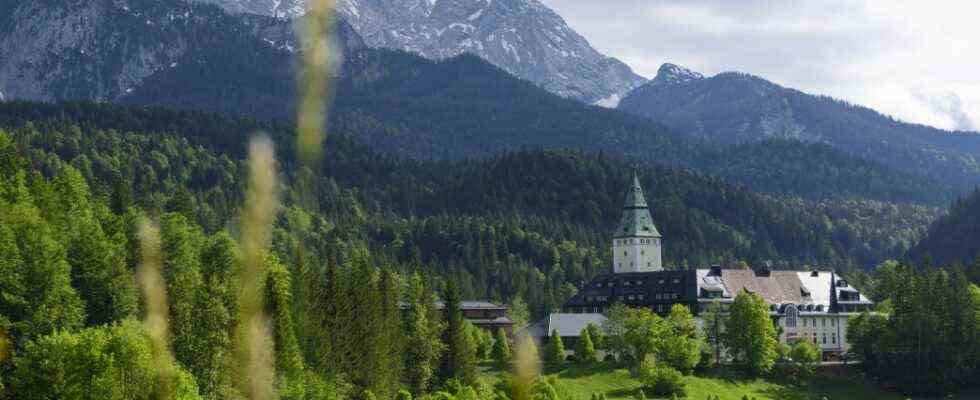At the beginning of 2014, when Angela Merkel announced a meeting of the heads of state and government of the most important industrial nations in Upper Bavaria’s Schloss Elmau for the following year, she was still talking about the G8. Shortly thereafter, Russian President Vladimir Putin occupied the Crimean Peninsula. He was therefore no longer welcome in Elmau in 2015, and the meeting went down in the annals as the G-7 summit. The new federal government surprised everyone in autumn that there should now be a second such entry for Elmau. “Of course, one could have come up with the idea of doing it somewhere else,” says Bavaria’s Interior Minister Joachim Herrmann (CSU) on the short-term decision. But “we have taken note of that, we accept that,” Herrmann describes the attitude of the state government – and it is “of course also an honor”.
Most people in the region see it in a similar way. The agenda has changed dramatically four months before the summit with the Russian attack on Ukraine, but otherwise preparations continue unabated.
A “close alliance”, a “close partnership” and “multilateral cooperation” are now needed, said the deputy spokesman for the federal government, Johannes Dimroth, on Sunday at an information event for the region in the summit municipality of Krün. “It is particularly important to us as the new federal government to leave a footprint with this presidency” – Berlin wants to speak about the earth as a “sustainable planet” from June 26th to 28th in Elmau, about the global economy after the Corona crisis, about investments in a better future and about resilient and well-fortified democracies.
In the region, the Bavarian and federal police have to reconcile the security authorities’ ability to defend themselves with the fundamental democratic right to freedom of demonstration. According to the Garmisch-Partenkirchen District Administrator Anton Speer (FW), the first registrations for three six-hour rallies with a total of 2500 participants have long been received, again submitted by the “Stop G7 Elmau Action Alliance”, which is currently revising its old website from 2015. At that time, by far the most opponents of the summit demonstrated in Munich, but thousands also gathered in Garmisch-Partenkirchen. A protest camp on the same meadow by the Loisach as in 2015 is also planned for this year.
Manfred Hauser (right), police chief of Oberbayern Süd, speaks during a first information event on the G-7 summit in the region, which was also attended by Interior Minister Joachim Herrmann (CSU).
(Photo: Uwe Lein/dpa)
Seven years ago, the protests remained relatively peaceful, partly because of a storm on the very day of what was possibly a particularly confrontational protest march. For this year, an almost three-digit number of scenarios are being played through in preparation, said the President of the Police Headquarters in Upper Bavaria South, Manfred Hauser. What was the largest operation in the history of the Bavarian police in 2015 with around 20,000 officers could be relegated to second place by this year’s summit. The state government expects costs of more than 166 million euros, another 30 million more than seven years ago. At that time there were “no corona demonstrations, no climate activists and no refugee crisis”, as District Administrator Speer put it.
In addition, the Passion Play in nearby Oberammergau runs throughout the summer, which intensifies the competition for hotel beds in the region. The hoteliers can look forward to comparatively fixed bookings, but otherwise many innkeepers and business people in the district expect sales to drop due to a lack of tourists and police officers who are hardly keen to spend. They lost between a quarter and almost half of their usual sales during the weeks surrounding the 2015 summit, complained on Sunday, for example, the chairwoman of the Garmischer Zentrum advertising association, Michaela Nelhiebel. Others also demanded compensation or recalled with horror all the controls and roadblocks of 2015. “Once and never again” is what one Mittenwalder wants to have thought after 2015, for another the repetition of the summit this year was “shock news”. .
Pupils should go to distance learning for three days
Herrmann announced that there will indeed be restrictions for locals and vacationers. As far as compensation for possible disadvantages is concerned, he referred to long-term state investments in roads, bridges or canals and to the huge advertising effect of the 2015 summit, but also offered talks. Any damage to farmers and homeowners should be insured.
Krün Mayor Thomas Schwarzenberger (CSU) suggested postponing the state-wide final exams for secondary school, business and vocational students, which are actually supposed to take place on the last two days of the summit. “It must not be that the summit becomes a disadvantage for our children and young people,” said Schwarzenberger. So far, the Ministry of Education has proposed three days of distance learning for students in the region.
At least the Minister of the Interior was able to completely dispel the worries of a young man who was willing to marry. As long as his guests don’t have explosives or baseball bats with them, it won’t be a problem for them to get from their accommodation in Tyrol across the border to the wedding a week before the summit. Both Herrmann and Dimroth promised a sustainable summit, after which all temporary structures and the helipad in the Elmauer Valley would be completely removed. And a third G-7 summit in Elmau is apparently no longer in Herrmann’s mind: Maybe one could “expand such a North Sea island in time”.

